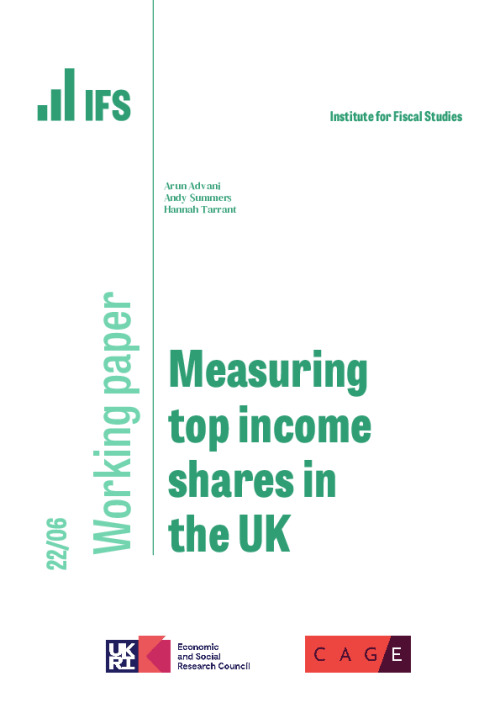Downloads

WP202206-Measuring-top-income-shares-in-the-UK.pdf
PDF | 3.71 MB
This paper examines measurement error in the share of income going to the top 1% (and other subgroups) that comes from estimation of the denominator. We compare two approaches. First, the default ‘external’ approach used in the current literature, which relies on different data sources for the numerator and denominator. Second, an alternative ‘augmented internal’ approach that uses the same data source for the denominator as for the numerator, but augments this to fill gaps in coverage. We set out four principled criteria for selecting between these approaches and argue that the ‘augmented internal’ approach is to be preferred. On this approach, the UK top 1% share is 2 percentage points higher than under the alternative ‘external’ approach.
Authors

Research Fellow University of Warwick
Arun is a Research Fellow at IFS, an Associate Professor of Economics at the University of Warwick and a Commissioner at the Wealth Tax Commission.

Research Fellow London School of Economics
Andy Summers is an Associate Professor of Law at the London School of Economics and an Associate of the International Inequalities Institute at LSE.

Hannah Tarrant
Working Paper details
- DOI
- 10.1920/wp.ifs.2022.0622
- Publisher
- Institute for Fiscal Studies
Suggested citation
A, Advani and A, Summers and H, Tarrant. (2022). Measuring top income shares in the UK. London: Institute for Fiscal Studies. Available at: https://ifs.org.uk/publications/measuring-top-income-shares-uk (accessed: 26 April 2024).
More from IFS
Understand this issue

Big firm, little firm: are differences between companies driving inequality and holding back growth?
30 August 2023

Spring Budget 2024: What you need to know
7 March 2024

How to fix our irrational income tax system
25 January 2024
Policy analysis

Recent trends in public sector pay
26 March 2024

Gap between higher- and lower-paid public sector workers falls by more than a third since 2007 as doctors and experienced teachers have faced unprecedented pay cuts
26 March 2024

The IFS Scottish Budget Report – 2024–25
22 February 2024
Academic research

Labour market inequality and the changing life cycle profile of male and female wages
15 April 2024

Interpreting cohort profiles of lifecycle earnings volatility
15 April 2024

There and back again: women’s marginal commuting costs
2 April 2024